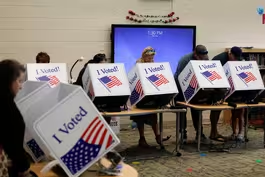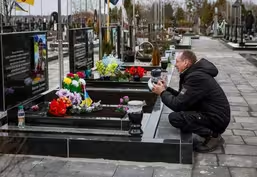
The growing health crisis of loneliness in America
Clip: 2/24/2024 | 6m 11sVideo has Closed Captions
How a growing crisis of loneliness is affecting Americans’ health
According to the American Psychiatric Association’s latest monthly poll, 1 in 3 Americans said they felt lonely at least once a week over the past year, with younger people more likely to report these feelings than other age groups. Edward Garcia, head of the nonprofit Coalition to End Social Isolation and Loneliness, joins Ali Rogin to discuss the cause and how communities can work to combat it.
Problems playing video? | Closed Captioning Feedback
Problems playing video? | Closed Captioning Feedback
Major corporate funding for the PBS News Hour is provided by BDO, BNSF, Consumer Cellular, American Cruise Lines, and Raymond James. Funding for the PBS NewsHour Weekend is provided by...

The growing health crisis of loneliness in America
Clip: 2/24/2024 | 6m 11sVideo has Closed Captions
According to the American Psychiatric Association’s latest monthly poll, 1 in 3 Americans said they felt lonely at least once a week over the past year, with younger people more likely to report these feelings than other age groups. Edward Garcia, head of the nonprofit Coalition to End Social Isolation and Loneliness, joins Ali Rogin to discuss the cause and how communities can work to combat it.
Problems playing video? | Closed Captioning Feedback
How to Watch PBS News Hour
PBS News Hour is available to stream on pbs.org and the free PBS App, available on iPhone, Apple TV, Android TV, Android smartphones, Amazon Fire TV, Amazon Fire Tablet, Roku, Samsung Smart TV, and Vizio.
Providing Support for PBS.org
Learn Moreabout PBS online sponsorshipJOHN YANG: The American Psychiatric Association's latest monthly poll found that one in three Americans said they felt lonely at least once a week over the past year.
And younger people were more likely to report these feelings than other age groups.
Ali Rogin has more on what's causing a surge in loneliness and how communities can work to combat it.
ALI ROGIN: Last year, U.S.
Surgeon General Vivek Murthy sounded the alarm on the effect chronic loneliness can have on people's health.
A report released from his office last spring revealed that social isolation can be as deadly as smoking up to 15 cigarettes a day.
Now some local leaders are heeding the warning.
In California, San Mateo County, which includes part of Silicon Valley, became the first in the nation to declare loneliness a public health emergency.
Edward Garcia heads the Coalition to End Social Isolation and Loneliness, a nonprofit organization that partners with healthcare experts and policymakers.
Edward, thank you so much for being here.
Why are we as a country so lonely?
EDWARD GARCIA, Coalition to End Social Isolation and Loneliness: Right know, I think there are many cultural drivers that look at why we're so lonely.
But I want to take it a little step back and say that loneliness and isolation are not new occurrences.
Unfortunately, the most marginalized in our society have always been at higher risk of social isolation and loneliness, and these are communities of lower socioeconomic status, minority groups like BIPOC communities and LGBTQ youth and many others.
I think what's coming to light now is that so many of us are now starting to feel the effects of social isolation and loneliness, especially coming out of the pandemic.
Some drivers of this have really looked at hyper individualism.
So how we are looking at our differences rather than what bonds us together, really hypered, tailored media consumption online platforms like social media, they're creating these alternative universes.
And when we step out of those, it can feel like we don't belong in the real world community.
ALI ROGIN: And you mentioned that marginalized communities have always been among those experiencing the highest rates of loneliness.
But tell us a little bit more about who exactly is the most lonely right now.
Who is the most at risk of experiencing loneliness in today's world?
EDWARD GARCIA: Again, everyone's at risk of social isolation and loneliness.
But to your point, think of, like, new moms who have lack supports, veterans, older adults that are homebound, or persons with mobility issues.
We've seen a lot of research around generation Z and young adults that have exhibited the highest rates of loneliness, upward of 79 percent.
There are many other populations that we're seeing that are also at risk.
ALI ROGIN: What about for elderly people who may indeed have friends and partners who they're not able to see on a regular basis?
People perhaps are passing away.
What is the landscape like for older adults right now?
EDWARD GARCIA: The pandemic very much impacted older adults, especially those who are in long term care facilities, nursing homes, and homebound.
Fortunately, the nation has really focused on older adults over the last 15, 20 years through programs, through the administration for community living, the area agencies on aging, and the older adult's network across the country.
We are seeing the development of new technologies that are helping older adults connect with others, not just supplant in person connections, but to help foster those connections.
We're even seeing our federal government move down a path of quality improvement activities in nursing homes to help connect intergenerationally young doctors and nurses with older adults.
ALI ROGIN: It's really interesting that you mentioned that because so many resources have been focused on those groups.
Perhaps they have better safety nets in place.
But you also mentioned Gen Z.
There are some young women, especially, who seem to be trying to reach out new friends in those ways, writing even friendship applications and then posting them.
What's happening with that age group right now?
EDWARD GARCIA: What we're seeing is one of the things, the drivers that I talked about at the beginning of the segment, really this hyper individualism.
So really focusing on our differences rather than thinking of ways to find commonality with our peers and the involvement with online time.
There are studies out of Europe looking at the increased times on social media use and passive use can lead to social isolation and loneliness.
ALI ROGIN: And we're talking about a public health emergency, not just in the abstract.
We're talking about this can have serious impacts on your physical health.
How does it affect a person's physical well-being?
EDWARD GARCIA: So on the physical side, it's the same risk of premature death as smoking 15 cigarettes per day, which is wild.
I think a lot of people don't realize that on the mental health side, it increases anxiety, suicidality and depression.
There's also evidence of a 50 percent increased risk of dementia.
ALI ROGIN: Tell us about some of the strategies that have been effective in reducing loneliness.
EDWARD GARCIA: So, I also want to take a step back on this question.
We are very concerned about the stigma around loneliness.
It's been thought of as a sort of individual problem, and a lot of people have been scared to come forward to talk about that.
So we have focused, while there are absolutely paths forward for individuals to connect, such as joining clubs, finding opportunities for in person connection through shared love of music or other activities.
We really want to focus on systemic, broad based policies, systems, environmental changes that help support federal, state and national and local strategies to address social disconnection.
As part of that, we've developed an action guide for local leaders to help them support communitywide strategies that look at various assets within their community and opportunities to impact communitywide social connections.
ALI ROGIN: And this issue isn't only affecting the United States.
Certainly, as you mentioned, other countries are dealing with it as well.
Are there solutions that have worked elsewhere in the world that the United States could learn from?
EDWARD GARCIA: Yes, absolutely.
The U.K. has been a leader in this space for the last 15 years.
They've implemented a minister of loneliness at their federal level, at their national level.
Excuse me, same thing in Japan, and we're seeing the same activity in Sweden, more specifically in the U.K., they've been very successful incorporating screening and referral for social disconnection within their national healthcare system.
So we're working very similar to implement that same strategy here in the US.
ALI ROGIN: Edward Garcia with the Coalition to end Social Isolation and loneliness, thank you so much for joining us.
EDWARD GARCIA: Wonderful to be here.
How South Carolina may affect Haley’s fight for nomination
Video has Closed Captions
Clip: 2/24/2024 | 4m 26s | How South Carolina’s GOP primary results may affect Haley’s fight for the nomination (4m 26s)
What lies ahead for Ukraine, 2 years since Russia’s invasion
Video has Closed Captions
Clip: 2/24/2024 | 7m 3s | What lies ahead as Ukraine marks somber 2-year anniversary of Russia’s invasion (7m 3s)
Providing Support for PBS.org
Learn Moreabout PBS online sponsorship
- News and Public Affairs

FRONTLINE is investigative journalism that questions, explains and changes our world.

- News and Public Affairs

Amanpour and Company features conversations with leaders and decision makers.












Support for PBS provided by:
Major corporate funding for the PBS News Hour is provided by BDO, BNSF, Consumer Cellular, American Cruise Lines, and Raymond James. Funding for the PBS NewsHour Weekend is provided by...

